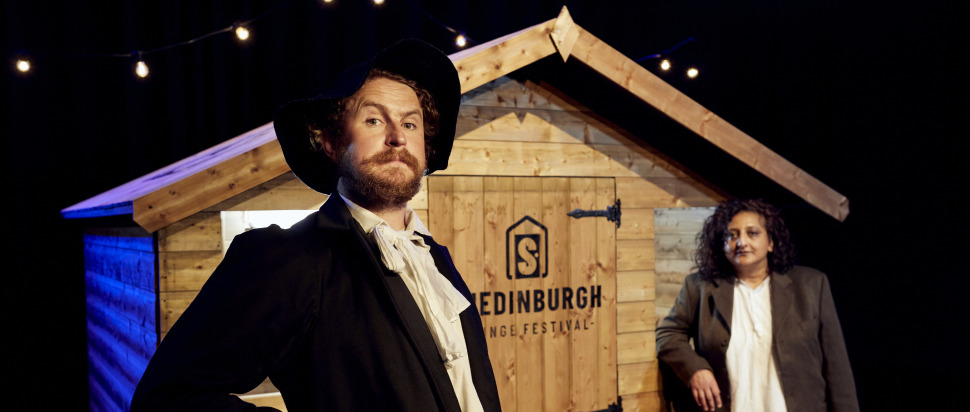A Shedload of Good: Shedinburgh returns to the Fringe
From Texas to Tokyo to Edinburgh College of Art, Shedinburgh brings a new approach to the Fringe's presentation to Edinburgh this August
With the annual Edinburgh Fringe fast approaching, conversations about the festival’s scale, accessibility, and sustainability are intensifying. The fact that the festival is becoming less accessible for creatives worldwide, in various ways that include venue fees, travel, and accommodation expenses, is undeniable. Not everyone has a friend’s couch or floor to crash on somewhere amenable to the city centre, or can pay the spiking costs of hotels, Airbnbs, and rental flats; not to mention the inevitable costs of living in Edinburgh throughout the festival. Most artists who take on the Fringe do so independently – in other words, without the backing of an organisation that can put them up for the duration of a run, and cover additional costs.
In the chaos of the Fringe programme, which features 3,352 individual acts this year, there is also the issue of the festival’s escalating size. This (perhaps) inevitable element of the world’s largest performing arts festival lends itself to the ‘hang around and hope’ mentality, which has come to define most artists’ approach to attending the festival. Under the current model, these issues of the Edinburgh Fringe are likely to persist or worsen. But the beginnings of a new model, presented by Francesca Moody Productions, arrive in the capital this August.
You may recall the Shedinburgh Fringe, an innovative turn to digital theatre in 2020 when the pandemic caused the cancellation of in-person festivities. Francesca Moody – the producer behind Fringe hits like Fleabag and Baby Reindeer – and co-producer Harriet Bolwell, alongside theatremaker Gary McNair, began this makeshift project in the wake of the Edinburgh Fringe’s cancellation, streaming 25 performances from two sheds – one at the Traverse Theatre, Edinburgh, and another at the Soho Theatre, London.
Since the stream reached over 5,000 viewers from Texas to Tokyo, Shedinburgh was revitalised the following year with a hybrid of digital and in-person theatre, comedy, and musical events (33 in total) and four free Shedx talks from industry professionals. After 2021, however, Moody, Bolwell, and McNair’s project appeared to have faded into a memory of pandemic past: just like so many circumstantial experiments that defined those years, it was shrugged into history by a welcome return to normalcy. That is, until August 2025.
‘The Shed’ will debut its inaugural live season at the 2025 Fringe, with a catalogue of one-night-only performances specially produced for a brand new venue. Propped up by a plethora of talented team members, including scenic designer Casey Jay Andrews, lighting designer Ryan Day, and stage manager Emma Vize, the Shed makes its home at the Wee Red Bar at the Edinburgh College of Art.
The Shedinburgh Fringe 2025 will carry forward the missions from its pandemic mould, offering fresh and exciting content for viewers, while championing new writing and putting artists at its centre. Noteworthy creatives appearing at the Shed this Fringe include Jayde Adams, Mark Watson, Marlow and Moss (the Tony Award-winning duo behind the hit musical Six), recent Olivier Award winner Maimuna Memon, Deborah Frances-White (host of The Guilty Feminist), and Fringe favourites Sh!t Theatre.
We can expect the usual concoction of theatre, stand-up, and music that Shedinburgh and the Edinburgh Fringe have become known for: ‘Shed Originals’ as well as ‘Shed Shows’, which are 'unplugged' revivals of previous Fringe hits. All performances, such as Jayde Adams: How To Lose and Not Cry, are currently sold out. However, a limited number of tickets may become available approximately 24 hours before each show. Otherwise, all Shed performances offer a pay-what-you-can option, making the venue more accessible to theatre-goers in general.
Responding to concerns about the Edinburgh Fringe’s inaccessibility and exclusivity, Shedinburgh is committed to putting artists first. It will continue the tradition of Shedx panels and Q&As, completely free of charge, and also guarantee living wages to all creatives bringing shows to the Shed, providing a safety net that is all too rare at modern-day festivals. Shedinburgh covers artists’ travel and accommodation expenses too, and offers an artist pass for 10% discounts on all food and drink available at the venue. An annual Fringe first-timer fund of £5,000, the Shedload of Futures Fund, also accompanies Shedinburgh 2025, which Francesca Moody Productions intends to continue for the foreseeable future. By night, an intimate 100-seat venue for 'unplugged, up-close, and unforgettable' shows, by day, a cafe/bar hangout spot for people to meet, collaborate, and create, the Shed is an artist-first concept intended as a reimagination of the exhausted Fringe model, and in this way, an intervention.
Whether this lockdown experiment turned practical intervention has longevity remains to be seen – whether the Shedinburgh Fringe is a driver of positive change that creates more than ripples across the Edinburgh Fringe, but causes more and more venues to follow in its footsteps. What I do know is that it could not come at a more pivotal moment in the Fringe’s history; its potential is nothing less than a shedload of good.
Shedinburgh, 74 Lauriston Pl, Edinburgh, 1-24 Aug
